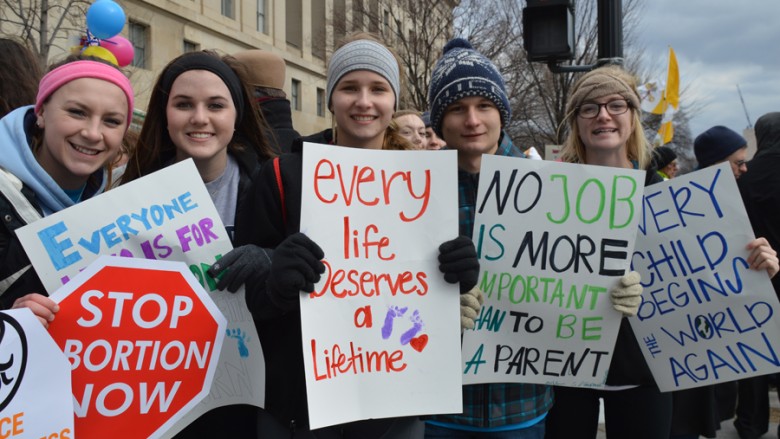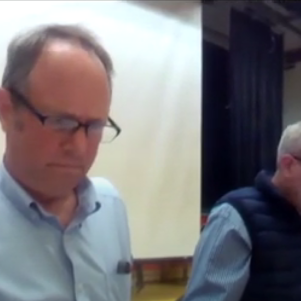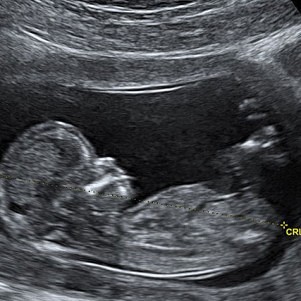Pro-life movement draws from humanitarian, liberal views
By Lizzie Short | January 25, 2016, 5:00 EST
 March for Life participants in 2015 (Catholic News Agency photo)
March for Life participants in 2015 (Catholic News Agency photo) Few Americans may realize that the fight to protect unborn children began long before Roe v. Wade, the 1973 U.S. Supreme Court decision that legalized abortion. While the contemporary pro-life movement is often characterized as driven by the religiously devout and political conservatives, the origins and development of the campaign may come as a surprise even to the most well-informed pro-lifer.
A new book by Daniel K. Williams, “Defenders of the Unborn: The Pro-Life Movement Before Roe v. Wade” seeks to tell a nuanced story of the history and development of the drive to protect women and the unborn.
“Pro-life activism actually began decades before Roe v. Wade or the formation of the National Organization for Women,” Williams argues, contrary to common and academic opinion. “And it originated not as a conservative backlash against individual rights, but as a defense of human rights for the unborn.”
The annual March for Life, which took place Friday in Washington, has also taken up this theme, reframing its message in the language of human rights in recent years, signaling a return to the kind of rhetoric Williams writes about in his book, which was published Jan. 7.
The pre-Roe v. Wade movement “was able to attract a politically and religiously diverse coalition that actually gained strength over time,” because it argued in the language of human and constitutional rights, such as the right to life, the author contends.
“The pro-life movement succeeded because it drew on the same language of human rights, civil rights, and the value of human life that inspired the struggle for African American freedom, the feminist movement, antiwar protests, and the campaign for the rights of gays and lesbians,” Williams says.
In the early 20th century, pro-lifers also supported Democratic President Franklin D. Roosevelt’s New Deal and government aid to the poor – the kind of liberalism traditionally associated with Democrats.
But few people would link Democratic leaders today with the pro-life movement. In fact, in recent years, the Democrats have coalesced into a pro-choice bloc, with many of its elected office holders, including those in Congress, backing pro-choice measures on everything from Planned Parenthood funding to late-term abortions.
According to the Democrats for Life scorecard, only two Democratic U.S. senators have a “perfect” record on pro-life legislation since April 2015, Joe Donnelly of Indiana and Joe Manchin of West Virginia. Pennsylvania Sen. Bob Casey, also a Democrat, clocks in at 80 percent, having voted against defunding Planned Parenthood.
But recent statements from prominent Democrats, including the party’s leader in the U.S. House of Representatives, Nancy Pelosi of California, suggest that members of the party may be taking a different approach to reproductive rights. They may be seeking common ground on this contentious issue by highlighting their support for contraception and focusing on curbing demand for abortions.
“I think the one thing, whether you happen to be pro-choice, pro-life, the one thing that we can agree on, I hope, is that we want to reduce the number of unplanned, unwanted pregnancies, and then there won’t be a demand for abortions,” Sen. Tom Carper, a Democrat from Delaware, said in a recent interview with WBOC-TV in Delaware, echoing comments U.S. Rep. Stephen Lynch, a Democrat from South Boston, made on the House floor years before.
“I’m a prolife Democrat,” Lynch said in 2011. But, he added, “I think we agreed at one point in this country that the best way to reduce abortion is to prevent unwanted pregnancies.”
Lynch’s House leader, Pelosi, went a step further earlier this month.
“I don’t believe in abortion on demand,” Pelosi said in an interview published by the Capitol Hill newspaper Roll Call.
“I don’t believe that abortion is a form of birth control or contraception,” she added. “If you want to diminish the number of abortions in our country, you should love contraception.”
Contraception and abortion have at times been linked. As Williams shows in his book, when the pro-life movement also supports access to contraceptives, it gains momentum; when it opposes contraception, it loses traction.
In the 1960s, the pro-life movement was in quandary. Many Catholics linked abortion and contraception as twin evils, which drove off members of other religious groups, such as Protestants and Jews. The Catholic Church at the time was the only large religious institution in America to oppose the use of contraceptives, even among married couples.
In the Second Vatican Council, commonly known as Vatican II, Catholic leaders conferred over doctrinal issues and revised certain elements in ways that had significant effects on members of the church who were pro-life activists. The changes loosened what had been considered immutable policies, such as holding the Pope to be infallible. They also meant priests no longer had to conduct Mass in Latin. The liberalization emboldened many lay Catholics, including some who chose to disregard the church’s longstanding prohibition of contraceptive use.
The new guidance on church doctrine from the Council in 1965, coupled with a Supreme Court decision that struck down a Connecticut statute outlawing contraceptives the same year, led many Catholics to separate contraception from abortion and frame their position on the latter issue in terms of human rights. By 1972, the pro-life movement had gained momentum and achieved legislative victories that had eluded them in the early 1960s.
The 21st century pro-life movement is reorienting itself towards a human rights perspective, as evidenced by the recent participation of feminist and nonreligious groups in the annual March for Life. As humanitarian language opens new avenues for Democratic involvement in the pro-life movement, it may come to look more like it did before Roe v. Wade. And just like in the 1960s, the pro-life stance on contraception may give the movement momentum or drag it to a halt.
Contact Lizzie Short at [email protected].
NBPLifeABC











